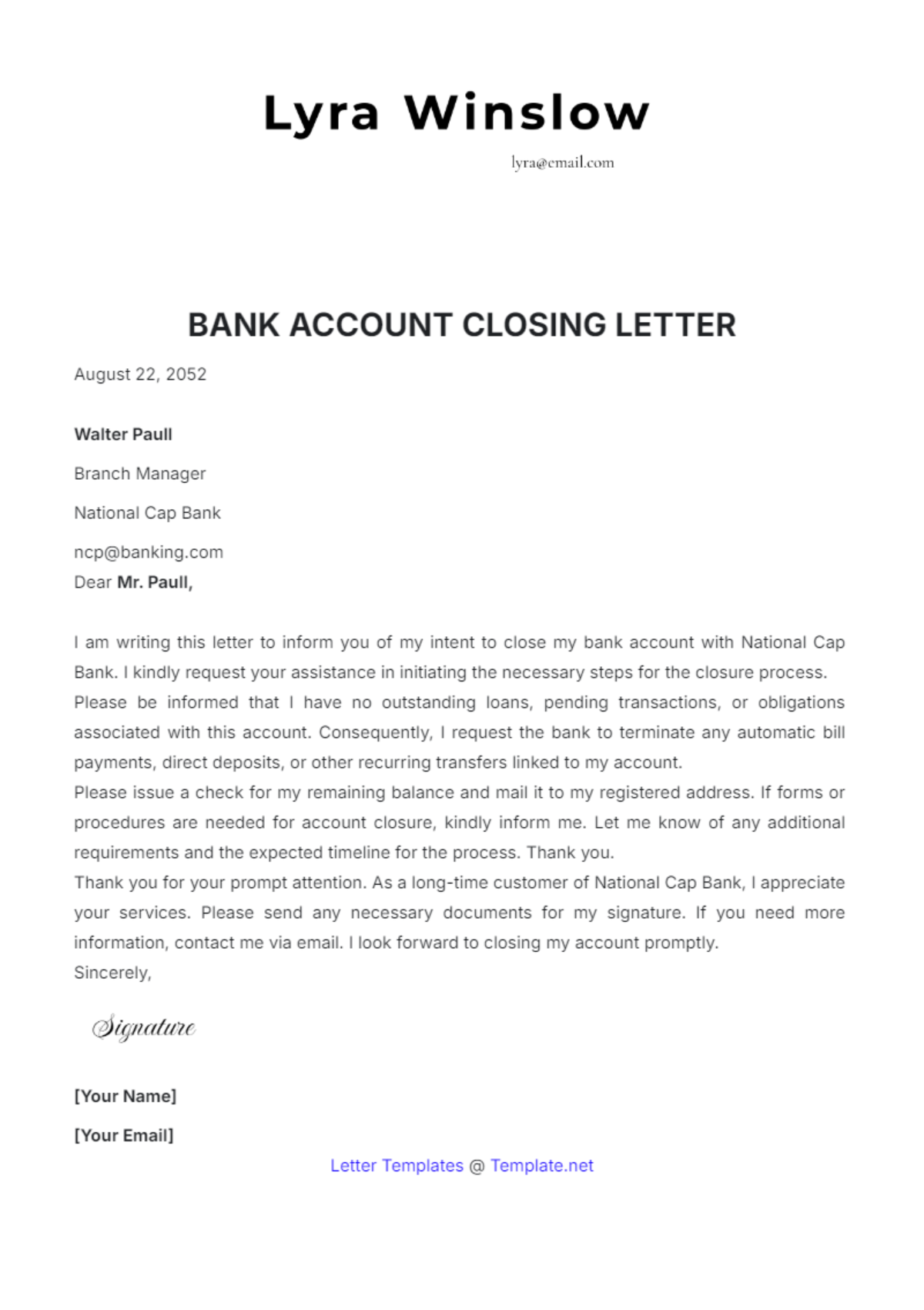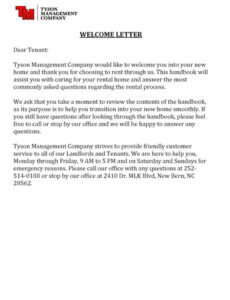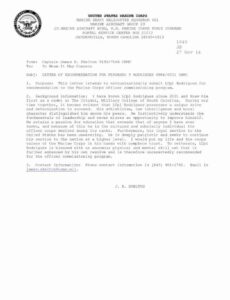In an era defined by rapid digital advancements, the need for clear, concise, and professionally documented communication remains paramount, especially in financial matters. Closing a bank account, whether personal or business-related, is a critical transaction that necessitates formal notification to the financial institution. This process safeguards against future liabilities, ensures all outstanding balances are settled, and provides a clear audit trail for both parties. Without a meticulously drafted notification, individuals and organizations risk ambiguity, potential miscommunications, or prolonged administrative issues.
This comprehensive article delves into the significance of a well-structured bank account cancellation letter template, offering guidance on its creation, customization, and effective deployment. Designed for US readers who prioritize precision in their financial dealings, this resource serves as an authoritative guide, simplifying a process that, while straightforward, demands attention to detail. Utilizing a robust bank account cancellation letter template is not merely a formality; it is a strategic step towards responsible financial management and clear professional communication.
The Indispensable Role of Written Communication in Financial Affairs
The landscape of financial transactions is inherently complex, involving myriad regulations, agreements, and data points. In this environment, written communication transcends mere formality to become an essential tool for clarity, legal standing, and conflict resolution. When engaging with financial institutions, formal correspondence provides an irrefutable record of interactions, intentions, and agreements. This official record is crucial for both individuals and businesses, establishing a clear timeline and content of all communicated directives.

Verbal instructions, while often convenient, lack the evidentiary weight of a written document. A professionally drafted business letter or notice letter serves as tangible proof of a request or notification, protecting all parties from potential misunderstandings or disputes. It eliminates ambiguity regarding critical details such as effective dates, account numbers, and specific instructions, thereby mitigating risks associated with misinterpretation. This foundational principle underscores why documents like a cancellation letter are not just good practice, but a necessity for sound financial governance.
Key Advantages of a Structured Bank Account Cancellation Letter Template
Employing a structured bank account cancellation letter template offers numerous benefits that streamline the account closure process and enhance professional communication. Foremost among these advantages is the assurance of consistency and completeness. A template guides the user to include all necessary information—account numbers, exact account names, and contact details—ensuring no critical data point is inadvertently omitted. This consistency reduces the likelihood of delays or requests for additional information from the bank.
Moreover, leveraging such a layout elevates the professionalism of your correspondence. Presenting a clear, well-organized document reflects positively on the sender, indicating attention to detail and a respectful approach to business communication. This structured approach helps maintain a formal tone, which is vital when dealing with financial institutions. Ultimately, a robust message template minimizes the potential for error, provides a clear audit trail, and offers peace of mind through documented actions.
Customizing the Template for Diverse Applications
While the core structure of a bank account cancellation letter template remains consistent, its strength lies in its adaptability. This foundational document can be readily customized to suit a wide array of specific circumstances, ensuring its applicability across different personal and business needs. For instance, an individual closing a personal checking account will require different specific details compared to a business dissolving an operating account or an executor managing an estate’s finances.
Customization involves tailoring the body paragraphs and specific requests to the unique situation at hand. For a personal account, details might include instructions for transferring remaining funds to another personal account or sending a check to a residential address. Conversely, a business might need to specify the closure of multiple associated accounts, provide instructions for final payroll processing, or designate where the remaining corporate funds should be disbursed. The flexibility of the document layout allows users to clearly articulate their specific needs, ensuring the bank understands and executes the request precisely as intended. Whether it’s a joint account, a trust account, or a corporate savings account, the template serves as a versatile framework for precise written requests.
Optimal Scenarios for Utilizing a Bank Account Cancellation Letter Template
The strategic use of a bank account cancellation letter template is particularly effective in several key situations where formal, documented communication is essential. These scenarios underscore the value of a structured approach to financial administration:
- Closing Inactive Accounts: Regularly reviewing and closing dormant or inactive accounts prevents potential security risks and streamlines personal or business financial oversight. A formal letter ensures the closure is properly recorded.
- Switching Financial Institutions: When transitioning to a new bank, a cancellation letter provides a clean break from the previous institution, clearly stating the intent to move all funds and cease banking relationships.
- Dissolution of a Business or Partnership: For businesses winding down operations or partnerships concluding, formal notification to close business accounts is crucial for legal compliance and financial closure.
- Managing an Estate: As an executor or administrator of an estate, closing the deceased’s bank accounts requires official communication to the bank, often accompanied by legal documents like a death certificate and letters testamentary.
- Addressing Fraud or Security Concerns: In cases where an account may have been compromised or is no longer secure, a formal letter of cancellation provides a documented instruction to the bank to close the account immediately, limiting potential damages.
- Simplifying Personal Finances: For individuals seeking to consolidate accounts or reduce the number of financial relationships, this type of written request offers a systematic way to achieve financial minimalism.
- Upon Reaching an Account’s Purpose: Some accounts are opened for specific, temporary purposes (e.g., a project fund). Once the purpose is served, the cancellation correspondence provides a formal endpoint.
In each of these instances, the precision and formality offered by the template ensure that the cancellation is handled efficiently, accurately, and with proper documentation for all parties involved.
Formatting, Tone, and Usability Best Practices
Effective formal correspondence, such as a bank account cancellation letter, relies heavily on meticulous formatting and an appropriate tone to convey its message with clarity and authority. Adhering to established business letter standards ensures the document is perceived as professional and serious. This involves including essential components such as the sender’s contact information, the date, the recipient’s bank address, a clear subject line, a formal salutation, the body of the message, a professional closing, and the sender’s signature.
The tone of the letter should always be formal, professional, and respectful, yet firm in its request. It should be concise and factual, avoiding emotional language or unnecessary details. State the purpose of the letter directly—the request to close the specified account—and provide all necessary identifying information (account number, account holder name). Clearly articulate any instructions regarding the disposition of remaining funds, such as a check mailed to a specific address or a transfer to another account.
For usability, especially in both print and digital versions, ensure the letter is easy to read and navigate. Use a standard, legible font (e.g., Times New Roman, Arial, Calibri) in a reasonable size (10-12 point). Utilize clear paragraph breaks to separate distinct pieces of information. If submitting digitally, a PDF format is generally preferred as it preserves the document layout and ensures consistency across different viewing platforms. For print, a single-page document is ideal, but if the content requires more, maintain logical flow. Always proofread the final file meticulously for any grammatical errors, typos, or inaccuracies in account details before sending. This meticulous attention to detail underscores the importance of the communication and helps ensure the request is processed without issue.
The Enduring Value of a Reliable Communication Tool
In an increasingly digitized world, the value of clear, documented communication remains undiminished, particularly in sensitive financial transactions. A meticulously crafted bank account cancellation letter template serves as a cornerstone of responsible financial management, providing a framework for precise and unambiguous directives to financial institutions. It eliminates the guesswork, reduces administrative burdens, and solidifies the legal and operational integrity of account closures.
This essential document empowers individuals and businesses alike to manage their financial relationships with confidence and control. By standardizing the process of account termination, the template ensures that all critical information is conveyed effectively, safeguarding against future liabilities and promoting transparent engagement. Its utility extends beyond mere formality, acting as a vital component of a proactive financial strategy.
Ultimately, embracing a structured template for such crucial correspondence is a testament to an individual’s or organization’s commitment to clarity, consistency, and professional communication. It stands as a reliable and efficient tool, indispensable for navigating the complexities of modern finance with assurance and integrity.


